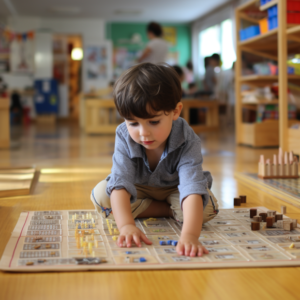The Montessori educational approach not only emphasizes academic development but also recognizes the significance of socialization and fostering positive interactions among children. Social skills play a vital role in a child’s overall development, shaping their ability to build relationships, communicate effectively, and collaborate with others. In this article, we will explore the importance of socialization in Montessori education and how it cultivates a sense of community and cooperation among young learners.
- Mixed-Age Grouping: Embracing Diversity
In Montessori classrooms, children of different ages interact and learn together. This mixed-age grouping fosters a sense of camaraderie, allowing younger children to look up to their older peers as role models while providing older children with opportunities to develop leadership skills and empathy. - Building Empathy and Respect
Montessori education places a strong emphasis on teaching children to respect one another’s uniqueness and individuality. Through socialization, children learn to empathize with their peers, understand different perspectives, and appreciate diversity. - Conflict Resolution and Communication
Socialization in Montessori settings creates a safe space for children to learn effective communication and conflict resolution skills. Teachers guide children in expressing their emotions and resolving conflicts peacefully, promoting a positive and respectful environment. - Collaborative Learning and Cooperative Play
Group activities and collaborative learning experiences are integral parts of the Montessori curriculum. These opportunities encourage teamwork and cooperative play, teaching children the value of working together towards common goals. - Promoting Independence and Responsibility
As children interact with their peers, they learn to take responsibility for their actions and decisions. Socialization in a Montessori environment nurtures independence and encourages children to contribute positively to their learning community. - Establishing a Sense of Belonging
In Montessori classrooms, socialization creates a sense of belonging and a supportive community. Children feel valued, accepted, and empowered to express themselves authentically, fostering a positive self-image and building confidence. - Cultivating Social Graces and Courtesy
Montessori education instills the importance of social graces and courtesy, teaching children to greet others, express gratitude, and engage in polite interactions. These skills form the foundation for building strong relationships and social confidence.
Conclusion:
Socialization is an essential aspect of Montessori education, promoting the development of vital life skills that extend far beyond the classroom. By nurturing positive interactions, empathy, and cooperation, Montessori classrooms foster a harmonious learning environment where children thrive academically and emotionally. Through mixed-age grouping, collaborative activities, and conflict resolution experiences, children learn to value diversity, communicate effectively, and embrace the importance of community. As a result, Montessori education prepares children not only for academic success but also for becoming compassionate, respectful, and socially adept individuals, ready to make a positive impact in the world around them.

